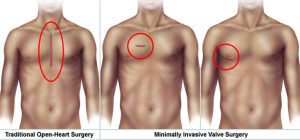

The heart surgeon sat resting at the fitness center when a man sat down next to him. Thinking he should make room, the doctor scooted over – twice. The man then leaned in and said with a twinkle in his eye, “You operated on me.”
The man in his late 80s was a regular at the gym, along with his wife. Six months earlier, he was having a heart valve replacement and coronary bypass surgery at Venice Regional Bayfront Health.
“This patient was very active before his aortic valve narrowed to the point that he was referred for surgery,” said Roberto Cervera, M.D., director of cardiovascular surgery at Venice Regional. “His cardiologist had followed him closely for 10 years, monitoring the valve’s condition.”
“As we monitor a patient’s condition over time, we can determine when medication is no longer sufficient to maintain proper blood flow through the narrowing valve,” said Michael A. Basnight, M.D., FACC, FSCAI, a board-certified cardiologist at Heart & Vascular Center of Venice. “This patient was starting to feel shortness of breath when he exerted, and imaging studies confirmed that his aortic valve stenosis (narrowing) required surgery.”
“Many patients over 75 years of age aren’t referred for surgery,” Dr. Cervera said. “There seems to be a belief these patients are too old to withstand a procedure. Today, we have many less invasive options that can extend a person’s longevity and quality of life, even in people of advanced age.”
One such option is a minimally invasive surgical procedure called aortic valve replacement, or AVR. Offered at Venice Regional, the technique is radically different from the traditional “zipper” up the chest associated with open heart surgery.
Aortic valve stenosis involves the narrowing of the aortic valve, which reduces blood flow through the heart. For patients requiring an aortic valve replacement, the most common surgical option is to open the chest, requiring lengthy hospitalizations and recovery times. More recently, doctors perform AVR either using a minimally invasive approach or using a catheter inserted through the femoral artery in the leg.
At Venice Regional, however, surgeons are performing a more advanced procedure using a less than two-inch incision in the chest to gain access to replace the damaged valve with a new, artificial valve. Typically, groin incisions accompany the
procedure to place the patient on a heart-lung machine. Dr. Cervera, however, works with only one incision in the chest, and there is no incision in the groin.
“Patients are seeing dramatically reduced hospitalizations and are able to return to normal activities much faster after undergoing a valve replacement procedure that we perform at Venice Regional,” Cervera said.
A study published in 2015 in The Annals of Thoracic Surgery reported that patients over 75 who received the minimally invasive procedure had fewer complications during the
procedure, a dramatically lower risk of kidney failure following surgery, a lower rate of wound infection, and shorter hospital stays.
Dr. Cervera said patients at Venice Regional who receive the minimally invasive procedure average three days of hospitalization, which is half the time generally required for conventional valve surgery. Recovery to normal activities also is more rapid.
Even with a new valve, patients may need continued medication and monitoring for other cardiovascular conditions, said Dr. Basnight. High blood pressure (hypertension) and high cholesterol, for example, require treatment regardless of surgery.
“Given the advanced age of many of the residents in our community, this is an important option for patients to discuss with their cardiologists,” Cervera said. “This is challenging the conventional wisdom that these patients are too old to undergo valve surgery, that they must simply live with their condition and accept diminished quality of life.”
Dr. Basnight agrees. “Patients don’t end their lives at 80,” he said. “If there are no other significant illnesses, patients receiving this surgery can enjoy years of life expectancy and with better quality of life.”
For more information about aortic valve stenosis and its treatment, call 941-483-7978.
Call 941.483.7978 or visit VeniceRegional.com
 Southwest Florida's Health and Wellness Magazine Health and Wellness Articles
Southwest Florida's Health and Wellness Magazine Health and Wellness Articles

